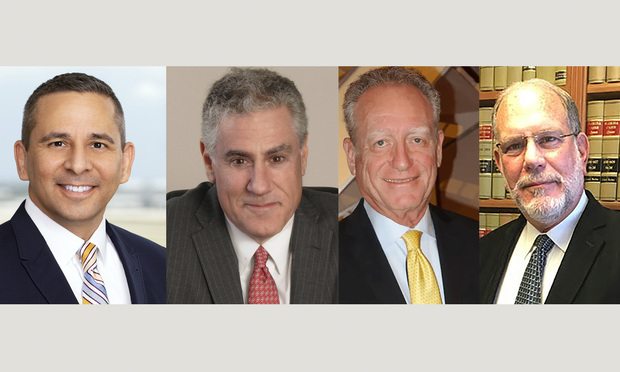 (l-r) Carlton Fields shareholder Christopher Smart in Tampa; Waldman Barnett partner Glen Waldman in Miami; attorney Mark Perlman in Hallandale Beach; and Blaxberg, Grayson, Kukoff & Forteza founding member I. Barry Blaxberg in Miami.
(l-r) Carlton Fields shareholder Christopher Smart in Tampa; Waldman Barnett partner Glen Waldman in Miami; attorney Mark Perlman in Hallandale Beach; and Blaxberg, Grayson, Kukoff & Forteza founding member I. Barry Blaxberg in Miami.
A state appeals court backed building rights for the developer of a planned 45-story mixed-use tower, which was opposed in a four-year legal challenge by two next-door condominium towers near North Miami.
Apeiron Miami LLC wants to develop 120 condo units, a 90-key hotel and 52-slip mega-yacht marina on a 14-acre site that's part of a bigger 22-acre property on Biscayne Bay at 11111 Biscayne Blvd. Three Jockey Club condominium towers are on the rest of the property.
Apeiron is led by former HBA International chairman Michael Bedner, Urbanis founder and former Related Group International vice president Muayad Abbas and Capella Hotel Group chairman and CEO Horst Schulze, according to the company website.
Jockey I and II sued the developer in 2016, claiming agreements dating back to 1977 and 1995 with the original Jockey Club developer don't permit Apeiron's plans.
The Third District Court of Appeal on June 7 affirmed the trial court's partial summary judgment in favor of Apeiron over the 1977 agreement and an order recognizing Apeiron's development rights under the 1995 agreement.
The unanimous unsigned opinion came from Judges Vance Salter, Norma Lindsey and Bronwyn Miller.
Retired Miami-Dade Circuit Judge John Thornton granted Apeiron's motion for summary judgment on the 1977 agreement claims in 2017. Following a bench trial, he issued an amended final order giving Apeiron the right to maintain and develop its property without the consent of Jockey I and II.
Apeiron attorney Christopher Smart, a Carlton Fields shareholder in Tampa, touted the opinion as a win not just for his client.
"It's a decisive and significant victory on appeal. It's very important not only for the company but also for upholding basic development and property rights in Florida," he said. "It's a very good thing."
Apeiron tried from the start to work with the homeowner associations. Although Jockey Club III supported the plan, Jockey I and II kept rejecting the developer's proposals, Smart said.
Smart worked on the case with Carlton shareholders Joseph Lang Jr. and Scott Feather in Tampa.
Jockey I and II attorney Glen Waldman, co-managing partner at Waldman Barnett in Miami, said the appellate opinion is disappointing, and Apeiron still won't be able to build the project as it wants.
"Based on the ruling that was affirmed, Apeiron will not be able to build the project that they envisioned, which would have disrupted and changed permanently the beauty of the Jockey Club," Waldman said.
Thornton preserved a parking easement for Jockey II and pool easements for Jockey I and II, saying Apeiron can't interfere with them.
"Their current plans do not work based on the rights we retained as a result of the final judgment. The plan that they have overlaps our parking lots and pools. Their footprint would go over our land," Waldman said. "They are going to have to reconfigure the plans, which means they can't build what they want to build."
Waldman represented the towers with law partner Jeffrey Lam.
The towers in another Miami-Dade Circuit Court suit filed last year are fighting Apeiron on the 45-story building height.
"Something probably half as big would be appropriate," Waldman said.
The Jockey Club developers built the complex starting in the 1960s. While the condo associations took ownership of their respective towers, Jockey Club kept a 14-acre common area. Before losing it in foreclosure in 1996, it entered the 1977 agreement with Jockey II and the 1995 agreement with all three towers.
Apeiron bought the common area in 2014.
The Jockey Club maintained the 1977 agreement was a restrictive covenant on the 14-acre parcel. The two tower associations amended their complaint to say the agreement bound Apeiron through a "successors and assigns" clause, the opinion said.
Apeiron argued it would be bound by the clause only if it were a corporate successor to the original developer or its express assignee rather than the land buyer.
The trial court rejected the restrictive covenant argument, and the appellate panel rejected the successor claim.
Under the 1995 agreement, Thornton said, "Apeiron has the right to not only develop, but to recommence its site maintenance" and "is not prohibited from developing on the common areas encumbered by" the maintenance easement.
When the original owner lost the property, the three towers formed the Jockey Club Maintenance Association Inc. to maintain the common area. After Apeiron bought the site in 2014, Jockey III withdrew from the maintenance association and entered a common services agreement with Apeiron.
Jockey III filed a third-party complaint over its monthly maintenance dues, and Thornton concluded Jockey III should pay the fees through May 2017 and then be released from its obligations. The appellate panel affirmed.
Jockey III attorney I. Barry Blaxberg, founding member at Blaxberg, Grayson, Kukoff & Forteza in Miami, said the decision recognized the tower has no further obligations to what is now a defunct maintenance association.
"We are totally supportive of the developer's efforts to have those plans approved and to have the county approve them and supported them in the appeal," Blaxberg said. "We were in favor of the ruling of the trial court to allow the development to go forward."
Blaxberg represented Jockey III with firm partner Ian Kukoff and associate Edward Proenza, who is no longer with the firm.
Attorney Mark Perlman represented the maintenance association.
"Jockey Club III did agree to pay its maintenance assessments to the Jockey Club Maintenance Association during the pendency of the lawsuit," he said.
Perlman, who also was the Jockey I attorney from 1995 until last year, said the issue for the towers came down to the drafting of the 1977 and 1995 agreements, which he said failed to include clear language and exhibits to make them enforceable.
"In my view, this is the reason for the decision by the Third District," he said. "The current unit owners will now bear the consequences of this by enduring five years of construction noise and debris and winding up with a crowded condominium campus in contrast to the peaceful environment which they previously enjoyed for many years."
Smart, Apeiron's attorney, said the project will keep the current open-campus feel.
"They were going to put a building or two, but they were going to keep the majority of that open area."
Read the opinion:
[falcon-embed src="embed_1"]
© 2025 ALM Global, LLC, All Rights Reserved. Request academic re-use from www.copyright.com. All other uses, submit a request to [email protected]. For more information visit Asset & Logo Licensing.








